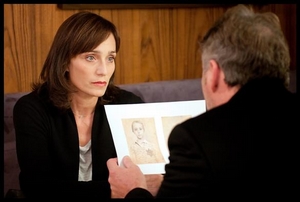Stuart:
Sarah’s Key is a war drama that is paradoxically wonderful and woeful at the same time.
The film concerns itself primarily with a family caught up in the Vel’ d’Hiv Roundup in 1942 when French police, at the behest of the Nazis, rounded up some 13,000 Jews and held them in the nearby velodrome. Young Sarah Starzynski (Mélusine Mayance) panics and locks her young brother, Michel, in a cupboard moments before she, her mother and her father are taken by the police. Immediately realising her mistake, her family attempt to get word out that their son is trapped, but very soon the Starzynskis are being shipped out to a concentration camp.
Young Sarah Starzynski (Mélusine Mayance) panics and locks her young brother, Michel, in a cupboard moments before she, her mother and her father are taken by the police. Immediately realising her mistake, her family attempt to get word out that their son is trapped, but very soon the Starzynskis are being shipped out to a concentration camp.
This is a brilliantly emotive retelling of history, and I for one didn’t know about the extent of the French authorities’ complicity with their Nazi occupiers. The production values are exquisite and the performance of Mayance in particular is faultless. It’s an extraordinary tale that isn’t soon forgotten.
There is another part to Sarah’s Key, however, and that is the scenes set in the present. Julia Armond (Kristin Scott Thomas) is a reporter researching the Roundup for a magazine. Her investigations begin to hone in on Sarah and her plight as she becomes obsessed with discovering exactly what became of the tragic figure.
These contemporary moments are gauche at best, and flat-out dreadful at worst. I’m not sure if it had to do with the fact that the characters were for the most part speaking English, but the performances are weak and the scenes awkward. Perhaps the language barrier made directing in another language problematic, or perhaps the French segments are just as bad but my not speaking the language means it doesn’t bother me so much. Nevertheless, the film grinds to a halt whenever we flash forward to Julia and her investigations.
Kristin Scott Thomas does well, for the record, but she has to deliver some truly strange pieces of dialogue. The others around her feel like they’ve either never acted before (which clearly isn’t the case with the likes of Aiden Quinn, whom was great in 2009’s The Eclipse) or else they didn’t get a chance to do any rehearsals before going in front of the cameras.
This really is a strange film. The historical sections are pitch perfect, and it’s such a fascinating story that it’s a pity they had to be sullied by the regular intrusions of the embarrassing present. Worse still, the final section of the film seems like it will never finish (in true Return of the King style) until, miraculously, it ends on an incredibly touching note. This last minute success by no means makes up for the patchwork nature of the rest of the film, but certainly solidifies the notion that you needn’t expect consistency from Sarah’s Key.
Some may be able to overlook the stilted half of this film, but I couldn’t in the face of such dizzyingly amateurish scenes. It’s only because of the last minute save that the hoopla factor manages to hit three.
Rating: